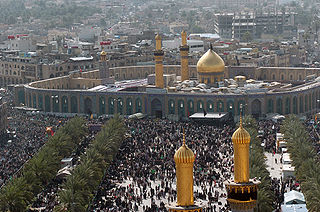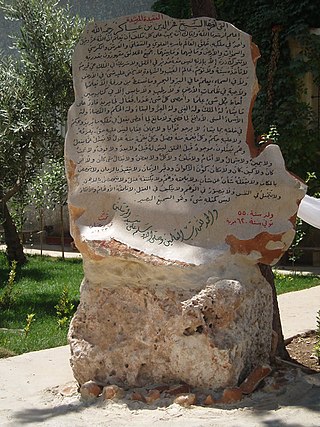
Ramadan is the ninth month of the Islamic calendar, observed by Muslims worldwide as a month of fasting (sawm), prayer, reflection, and community. A commemoration of Muhammad's first revelation, the annual observance of Ramadan is regarded as one of the Five Pillars of Islam and lasts twenty-nine to thirty days, from one sighting of the crescent moon to the next.
Adhan, also variously transliterated as athan, adhane, ajan/ajaan, azan/azaan, adzan, and ezan, among other languages, is the Islamic call to public prayer (salah) in a mosque recited by a muezzin at prescribed times of the day.

The Farewell Sermon also known as Muhammad's Final Sermon or the Last Sermon, is a religious speech, delivered by the Islamic prophet Muhammad on Friday the 9th of Dhu al-Hijjah, 10 AH in the Uranah valley of Mount Arafat, during the Islamic pilgrimage of Hajj. Muhammad al-Bukhari refers to the sermon and quotes part of it in his Sahih al-Bukhari. Part of it is also present in Sahih Muslim and Sunan Abu Dawood. Verse 5:3, "Today I have perfected for you your religion ...", is believed to have been recited during the address as the capstone verse of the Quran. Various versions of the sermon have been published, including several English translations. The sermon consists of a series of general exhortations for Muslims to follow the teachings that Muhammad had set forth in the Quran and sunnah.
Al-Falaq or The Daybreak is the 113th chapter (sūrah) of the Qur'an. It is a brief five ayat (verse) surah, asking God for protection from evil:
Al-Asr is the 103rd chapter (sūrah) of the Qur’ān, the Muslim holy book. It contains three āyāt or verses. Surat al-‘Asr is the third shortest chapter after Al-Kawthar and Al-Nasr, being shorter than Al-Nasr by only two words in the 3rd verse.
Al-Mulk is the 67th chapter (surah) of the Quran, comprising 30 verses. The surah emphasizes that no individual can impose his will on another; he may only guide and set an example (67:26).

An-Nāziʻāt is the seventy-ninth sura of the Qur'an, with 46 ayat. Its name derived from the word wan-nazi‘at with which it opens. The root (n-z-‘) roughly means "to yank out with great force", although it can also mean "to yearn for" or "to yearn after".
Sūrat al-Layl is the ninety-second sūrah (chapter) of the Qur'an, containing twenty-one āyāt (verses). This sūrah is one of the first ten to be revealed in Mecca. It contrasts two types of people, the charitable and the miserly, and describes each of their characteristics.
The Throne Verse is the 255th verse of the 2nd chapter of the Quran, Al-Baqara (Q2:255). The verse speaks about how nothing and nobody is regarded to be comparable to God.

Imāmah means "leadership" and is a concept in Twelver theology. The Twelve Imams are the spiritual and political successors to Muhammad, the Prophet of Islam, in the Twelver branch of Shia Islam. According to Twelver theology, the successors to Muhammad are infallible human beings, who rule justly over the community and maintain and interpret sharia and undertake the esoteric interpretation of the Quran. The words and deeds of Muhammad and the Imams guide the community. For this, the Imams must be free from error and sin and chosen by divine decree—nass—through the Prophet.
Al-Miqdad ibn Amr al-Bahrani, better known as al-Miqdad ibn al-Aswad al-Kindi or simply Miqdad, was one of the companions of the Islamic prophet Muhammad. His kunya was Abu Ma'bad. Miqdad was born in Eastern Arabia. He became fugitive in his hometown and ran to Mecca, where he served Aswad al-Kindi. Miqdad managed to gain favor of his master, who in turn adopted him as his son.

Ramadan is the ninth month of the Islamic calendar, and the month in which the Quran is believed to be revealed to the Islamic prophet Muhammad.
Verse (ayah) 256 of Al-Baqara is a very famous verse in the Islamic scripture, the Quran. The verse includes the phrase that "there is no compulsion in religion". Immediately after making this statement, the Quran offers a rationale for it: Since the revelation has, through explanation, clarification, and repetition, clearly distinguished the path of guidance from the path of misguidance, it is now up to people to choose the one or the other path. This verse comes right after the Throne Verse.
The Tashahhud, also known as at-Tahiyyat, is the portion of the Muslim prayer where the person kneels or sits on the ground facing the qibla, glorifies God, and greets the messenger and the righteous people of God followed by the two testimonials. The recitation is usually followed by an invocation of the blessings and peace upon the prophet known as Salawat.
Salat al-Istikhaara, which translates to Prayer of Seeking Counsel, is a prayer recited by Muslims who are in need of guidance from God Almighty (Allah) when facing a decision in their life. The prayer, known as salah in Arabic is performed in two units of prayer or raka'ah followed by the supplication of Salat al-Istikhaara.
Ibn Abī Zayd (922–996), fully Abū Muḥammad ʿAbd Allāh ibn Abī Zayd ʿAbd al-Raḥmān al-Nafzawī ibn Abī Zayd al-Qayrawanī, was a Maliki scholar from Kairouan in Tunisia and was also an active proponent of Ash'ari thought. His best known work is Al-Risala or the Epistle, an instructional book devoted to the education of young children. He was a member of the Nafzawah Berber tribe and lived in Kairouan. In addition, he served as the Imam of one of the mosques' that followed the Maliki School tradition. Based on what he wrote in his Risalah regarding creed, there was many alignments with the Ashari creed. Ibn Abi Zayd notably defended the ashari school in his epistle entitled “Al-Radd `ala al-Qadariyya wa Munaqada Risala al-Baghdadi al-Mu`tazili,” a refutation of the attacks of the Mu`tazili `Ali ibn Isma`il al-Baghdadi.

Istighfar, is the act of seeking forgiveness from Allah, usually by saying ʾastaġfiru -llāha. A longer variant is ʾastaġfiru -llāha rabbī wa-ʾatūbu ʾilayhi which means "Verily, I seek the forgiveness of God, who is my Lord and Sustainer, and I turn to Him in repentance". It is considered one of the essential parts of worship in Islam.
Hadith al-Silsilah al-Dhahab is a hadith narrated from Ali al-Ridha, the eighth Imam of the Shia. The "chain" is a reference to the continuity of spiritual authority which is passed down from Muhammad to Ali ibn Abi Talib, through each of the Imams, to Imam Ridha. As transmitters of Hadith, the Imams link subsequent generations to the teachings of Mohammad. This transmission makes the Hadith of the Golden Chain valued as among the most truthful and accurate of all Hadiths for the Shi'ite.
Islam uses a number of conventionally complimentary phrases praising Allah, or wishing good things upon Muhammad or other prophets and chosen figures of God. These phrases are encompassed by a number of terms: Prayers upon Muhammad may be referred to simply as Arabic: صَلَوات, romanized: ṣalawāt, "prayers", Persian: درود, romanized: dorud, "greetings", or Urdu: درود, romanized: durūd.

Muhammad al-'Arabi al-Tabbani, also known as Abu Hamid ibn Marzuq was an Algerian Maliki jurist (faqih), Ash'ari theologian, Hadith scholar (muhaddith), historian (mu'arrikh), and a genealogist (nassāba), who was the Imam of the Great Mosque in Mecca in his time.






